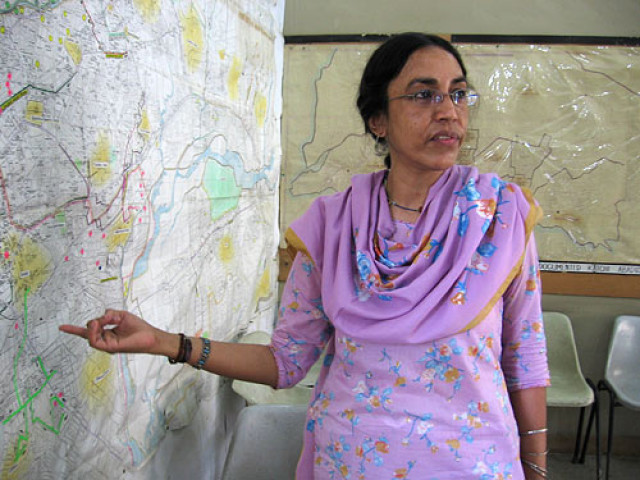Socially responsive workers: ‘Perween Rahman’s salary was Rs32,000 the day she died’
Arif Hasan speaks of the late OPP director’s philosophy.

Social Activist Perveen Rehman. PHOTO: NPR
For Arif Hasan it is not easy to talk about Perween Rahman, the director of one of Pakistan’s most celebrated socially responsive organisations - the Orangi Pilot Project Research and Training Institute. She was shot dead on March 13 in an attack that highlighted just how powerful Karachi’s mafias can be.
It was not easy, but Hasan did talk about her and he had an auditorium full of people who wanted to listen. They were urban planners, architects, social researchers, students who had come to attend the eighth annual NED University seminar on the dynamics of land and planning on Saturday. According to lecturer Najia Zaidi, Rahman was supposed to be the chief guest. She had confirmed she would come just two days before her murder.
Instead, in the chilly NED auditorium, there was silence as that image of her was projected overhead. She is mid sentence, pointing to a map.
The photograph encapsulates what Hasan said was her philosophy: Samjho, seekho, samjhao (Understand, learn, explain). She wanted to understand people’s processes, not impose her will. “Trends and not conditions” mattered to her, said Hasan. Conditions were static.
Rahman had insisted that any research that was done could not be esoteric - it needed to have an outcome, a result, some use. He admitted, of course, that there had been plenty of disagreement over the years on these fundamental questions. “Why should we do it,” she would tell him. “Let the people do it.” She was right. She was able to unite people. She spoke to them at their level.
Hasan first met Rahman when she was a student of his at the Dawood College for Engineering and Technology in 1979. She graduated in 1981 and disappeared. But, a year later, he found her waiting in his office. “I don’t like the offices where I am working,” she told him. She didn’t like the culture. “Ye sab ameeron ke lye kaam karte hain.” She felt they all worked for the rich. She wanted advice. What could she do?
He sent her packing to the Orangi Pilot Project and told Akhtar Hameed Khan that she would be interning there. But Hasan was skeptical. Two ex-students had barely lasted a few days.
She was still there six months later. No salary.
Thirty years later, on the day she died, she had just drawn her salary. It was 32,000 rupees. Her philosophy was that the salaries at OPP should not be so high that they would feel embarrassment publishing them in the community.
She said no to lucrative consultancies. According to Hasan, there was once one from Africa that was paying more than the combined salary of the entire OPP staff. He persuaded her to go ahead with the work. She took only 200 pounds as remuneration. The bulk of the consultancy fee went to buying laptops for the OPP staff across Pakistan.
“She was not a social worker but a diehard professional,” concluded Hasan. “She was basically doing people management - at a ridiculously low cost.”
Published in The Express Tribune, April 6th, 2013.



















COMMENTS
Comments are moderated and generally will be posted if they are on-topic and not abusive.
For more information, please see our Comments FAQ